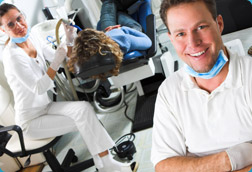Dental Technician
The dental world is changing fast and one of the most significant areas of change is in the types of products and materials that are now available. Dentures, crowns, bridges and braces are becoming more sophisticated and more advanced. They are available to patients in a wide array of different materials and compound materials. This means that the role of the dental technician is now more important than ever.
What does the job involve?
Dental technicians do not usually work in the dental practices. However, they are still an important part of the dental team. Working in dental laboratories, the technicians shape and mould crowns, dentures, bridges to replace lost and extracted teeth. They also make the braces used to move and correct crooked or misaligned teeth.
Dental Technicians usually specialise in one of four areas:
- Technicians who make dentures are known as Prosthodontic Technicians
- Technicians who focus solely on crowns and bridges are known as Conservation Technicians.
- Technicians who make braces are called Orthodontic Technicians
- Technicians who specialise in facial reconstruction are called Maxillofacial Technicians.
The majority of the work that Dental Technicians do is to tailored to suit the requirements of an individual patient. Therefore, they often liaise closely with the dentist to ensure that the product they develop is perfect for the patient who requires it.
What qualifications do you need?
There are a number of routes to becoming a Dental Technician. Some people enter the profession as graduates, usually with a degree in Dental Technology. However, a degree is not essential. Others join organisations directly as Trainee Dental Technicians. They develop their skills through a combination and on-the-job training and study towards a formal qualification.
Ultimately, to become a Dental Technician, you must be registered with the General Dental Council. To register, you will need to hold an approved qualification – such as a degree or a BTEC in Dental Technology.
What are the career prospects?
Your career as a dental technician can develop in a number of ways. As your skills develop, you can move up to become a team leader or supervisor, ensuring that the products your team makes are of the highest quality. Alternatively, you could move into the sales side of the business, working closely with dentists and dental organisations to understand their needs and provide the right kinds of product solutions.
Finally, some Dental Technicians continue to build their specialist skills and, in the future, move into the design and development of new products, rather than simply the manufacturing.
Featured Jobs
-
Example Job
- Salary:
- £24,000
- Location:
- Preston, Lancashire
Lorem ipsum dolor sit amet, consectetuer adipiscing elit. Nam nisl ipsum, interdum id, fermentum ut, convallis sed, tellus.
More Info -
Example Job
- Salary:
- £24,000
- Location:
- Preston, Lancashire
Lorem ipsum dolor sit amet, consectetuer adipiscing elit. Nam nisl ipsum, interdum id, fermentum ut, convallis sed, tellus.
More Info -
Example Job
- Salary:
- £24,000
- Location:
- Preston, Lancashire
Lorem ipsum dolor sit amet, consectetuer adipiscing elit. Nam nisl ipsum, interdum id, fermentum ut, convallis sed, tellus.
More Info
